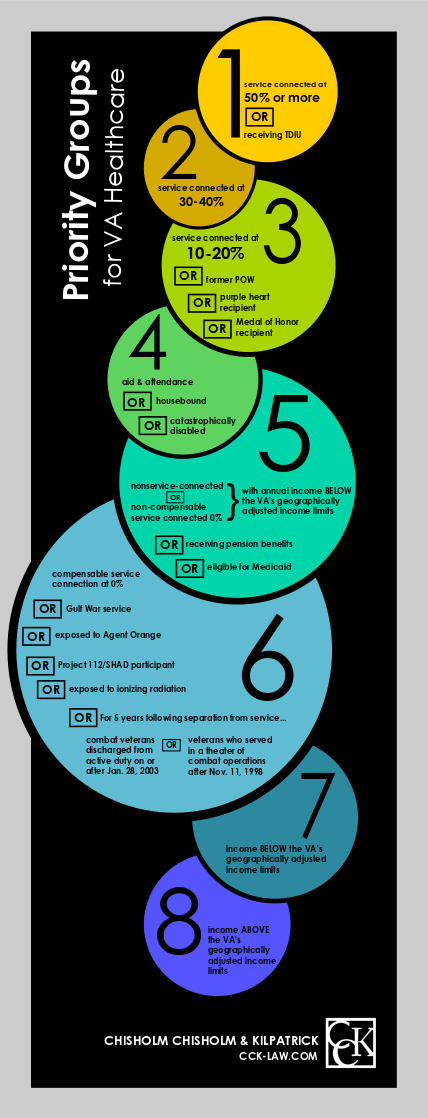Billing & Insurance
Copayments
VA Form 5655 is an application for prescription copayment waivers for priority group 5. VA Form 1100 is a repayment agreement and applies to all Veterans who have entered into a repayment arrangement. The website discusses the changes further and some of the ways we can help. We’re canceling and refunding copayments for the following benefits: All medical care received through VA between April 6, 2020, and September 30, 2021 All prescription medications received through VA between April 6, 2020, and September 30, 2021 Learn more about what this means for your copayments. Health Care Co-payments. Co-payments are required for non-service connected and zero% non-compensable veterans whose income is above the established threshold that is set annually by VA. Click on your state, and the VA medical centers will be listed along with phone numbers. The Department of Veterans Affairs (VA) charges a copayment for each 30-day or less supply of medication provided on an outpatient basis for the treatment of a non-service connected condition. The copayment amounts are.
(1) Except as provided in paragraphs (d), (e), or (f) of this section, a veteran, as a condition for receiving outpatient medical care provided by VA (provided either directly by VA or obtained by VA by contract, provider agreement, or sharing agreement), must agree to pay VA (and is obligated to pay VA) a copayment as set forth in paragraph (c)(2) or (c)(4) of this section.
The US Department of Veterans Affairs has established guidelines for veterans and their copayments. Copayments may be charged for the following services:
- inpatient care
- outpatient care
- outpatient prescriptions
- long-term care
Any copayments due should be paid upon checking out of the medical center. Copayments may be made at the Agent Cashier window located in Building 2, Room 63. The Agent Cashier is open Monday through Friday, 8 a.m. to 4 p.m.

Veterans who do not make their copayments upon checking out will receive a bill at their address of record within 30 days after their stay or appointment. If you have any questions about your copay balance, please contact our Billing Office at (866) 347-2353.
Other Health Insurance
The Department of Veterans Affairs now bills private health insurance companies for care received by their enrollees. You should bring your insurance card with you for your appointment and present it during the check-in process.
Medicare/Medicaid
The Department of Veterans Affairs does not bill Medicare or Medicaid at this time.
Private Health Insurance
VA is required by law to bill private health insurance carriers for medical care, supplies and prescriptions provided for treatment of Veterans' nonservice-connected conditions. Private health insurance coverage through a Veteran or Veteran's spouse is insurance provided by an employer, Veteran or other non-federal source, including Medicare supplemental plans. Generally, VA does not bill Medicare or Medicaid for reimbursement; however, VA does bill other types of health insurance including Medicare Supplemental plans for covered services.
Note: A Veteran’s insurance coverage or lack of insurance coverage does not determine their eligibility for treatment at a VA health care facility.
Veterans applying for and using VA medical care must provide their health insurance information, including coverage provided under policies of their spouses. Veterans are not responsible for the remaining balance shown as patient responsibility on the explanation of benefits from their insurance carrier. However, Veterans may be responsible for a VA copayment depending on their assigned Priority Group.

Importance of Providing Health Insurance Information

- Veterans are not responsible for any unpaid balance that the insurance carrier does not pay, except for VA copayments they may be required to pay, depending on their assigned Priority Group.
- Payments received from a Veteran’s private health insurance carrier are credited towards any applicable VA copayments, reducing all or part of the Veterans out-of-pocket expenses.
- Many private health insurance companies will apply VA health care charges towards satisfying a Veteran's annual deductible and maximum out of pocket expnse.
- Money collected by VA from private health insurance carriers is returned back to the VA medical center providing the care. The funds are used to provide the best care possible to our Veterans.
Cancelling Private Health Insurance
Veterans who have private health insurance should consider a number of important factors before canceling their health insurance, such as:
- Impacts to Family Members. VA does not normally provide care for family members of Veterans enrolled in VA health care. If you cancel your private health insurance, they may have no health care coverage.
- Disenrollment in VA health care. There is no guarantee that in subsequent years Congress will appropriate sufficient funds for VA to provide care for all enrollment Priority Groups. This could happen if you are enrolled in one of the lower Priority Groups. This would leave a Veteran with no health care coverage.
- Medicare Parts A and B. VA does not require a Veteran to have Medicare Part A or B to be enrolled in VA health care. However, Veterans should always consider their current and future health care needs before changing any insurance coverage.
If you cancel your Medicare Part B Coverage, you need to know that you cannot be reinstated until January of the following year, and you may be penalized for reinstatement.

In most cases, if you don't sign up for Part B when you are first eligible, you'll have to pay a late enrollment penalty. You will have to pay this penalty for as long as you have Part B. Your monthly premium for Part B may go up 10% for each full 12-month period that you could have had Part B, but didn't sign up for it. Also, you may have to wait until the General Enrollment Period (from January 1 to March 31) to enroll in Part B. Coverage will start July 1 of that year.
For these reasons, VA strongly encourages Veterans to consider important factors, risks and benefits before making any changes to their private health insurance.
Billing & Insurance
Attention Veterans with co-pays. Please read this important information concerning recent monthly co-pay suspensions.
On April 6, VA stopped sending monthly copay billing statements. The suspension applied only to Veterans who had copayments for medical care or prescriptions. It will run until Dec. 31, 2020.
Unless otherwise directed, VA will resume sending out monthly copay patient statements beginning in January of 2021. Veterans will receive a patient statement that may include the total amount of any:
- New copay charges for medical care and prescriptions they received from April 6, 2020, through December 31, 2020
- Unpaid copay charges for medical care and prescriptions they received before April 2020
We understand this may impose a financial burden on some of our Veterans, and we’re doing everything we can to help. If you can’t make your payments when billing starts again, please call us at 866-400-1238 or 844-698-2311 (TTY: 711). We’ll help determine your debt relief options.
For debt related to VA benefits, please contact the VA Debt Management Center at 800-827-0648 7:30 a.m. to 7 p.m. ET Monday through Friday.
For debt related to VA health care, or if you can pay your medical bills before Dec. 31, 2020, please contact the Health Resource Center at 888-827-4817. You can also pay online at www.pay.gov, or at the agent cashier’s office at a local VA medical center.
Attached, are three forms Veterans can fill out to help with their debt:
- VA Form 10-10HS is a request for hardship determination for priority groups 6, 7, 8a,c,d.
- VA Form 5655 is an application for prescription copayment waivers for priority group 5.
- VA Form 1100 is a repayment agreement and applies to all Veterans who have entered into a repayment arrangement.
The website https://www.va.gov/coronavirus-veteran-frequently-asked-questions/ discusses the changes further and some of the ways we can help.
If you have questions about your debts or medical bills, please reach out to us before the holidays so you are not left unprepared. Please feel free to contact our local customer service team at (801) 582-1565 ext. 1900 if you have additional questions.
You can read more about the decision here: https://www.whitehouse.gov/briefings-statements/remarks-president-trump-vice-president-pence-members-coronavirus-task-force-press-briefing-17/

Pay Va Medical Co Payment
Billing Inquiries
To speak with someone about billing inquiries, please contact our Billing Office at 406-447-7844.
Private Health Insurance
VA is required by law to bill private health insurance carriers for medical care, supplies and prescriptions provided for treatment of Veterans' nonservice-connected conditions. Private health insurance coverage through a Veteran or Veteran's spouse is insurance provided by an employer, Veteran or other non-federal source, including Medicare supplemental plans. Generally, VA does not bill Medicare or Medicaid for reimbursement; however, VA does bill other types of health insurance including Medicare Supplemental plans for covered services.
Note: A Veteran’s insurance coverage or lack of insurance coverage does not determine their eligibility for treatment at a VA health care facility.
Veterans applying for and using VA medical care must provide their health insurance information, including coverage provided under policies of their spouses. Veterans are not responsible for the remaining balance shown as patient responsibility on the explanation of benefits from their insurance carrier. However, Veterans may be responsible for a VA copayment depending on their assigned Priority Group.
Importance of Providing Health Insurance Information
- Veterans are not responsible for any unpaid balance that the insurance carrier does not pay, except for VA copayments they may be required to pay, depending on their assigned Priority Group.
- Payments received from a Veteran’s private health insurance carrier are credited towards any applicable VA copayments, reducing all or part of the Veterans out-of-pocket expenses.
- Many private health insurance companies will apply VA health care charges towards satisfying a Veteran's annual deductible and maximum out of pocket expnse.
- Money collected by VA from private health insurance carriers is returned back to the VA medical center providing the care. The funds are used to provide the best care possible to our Veterans.
Cancelling Private Health Insurance
Veterans who have private health insurance should consider a number of important factors before canceling their health insurance, such as:
- Impacts to Family Members. VA does not normally provide care for family members of Veterans enrolled in VA health care. If you cancel your private health insurance, they may have no health care coverage.
- Disenrollment in VA health care. There is no guarantee that in subsequent years Congress will appropriate sufficient funds for VA to provide care for all enrollment Priority Groups. This could happen if you are enrolled in one of the lower Priority Groups. This would leave a Veteran with no health care coverage.
- Medicare Parts A and B. VA does not require a Veteran to have Medicare Part A or B to be enrolled in VA health care. However, Veterans should always consider their current and future health care needs before changing any insurance coverage.
If you cancel your Medicare Part B Coverage, you need to know that you cannot be reinstated until January of the following year, and you may be penalized for reinstatement.
In most cases, if you don't sign up for Part B when you are first eligible, you'll have to pay a late enrollment penalty. You will have to pay this penalty for as long as you have Part B. Your monthly premium for Part B may go up 10% for each full 12-month period that you could have had Part B, but didn't sign up for it. Also, you may have to wait until the General Enrollment Period (from January 1 to March 31) to enroll in Part B. Coverage will start July 1 of that year.
Does The Va Charge A Copay
For these reasons, VA strongly encourages Veterans to consider important factors, risks and benefits before making any changes to their private health insurance.
